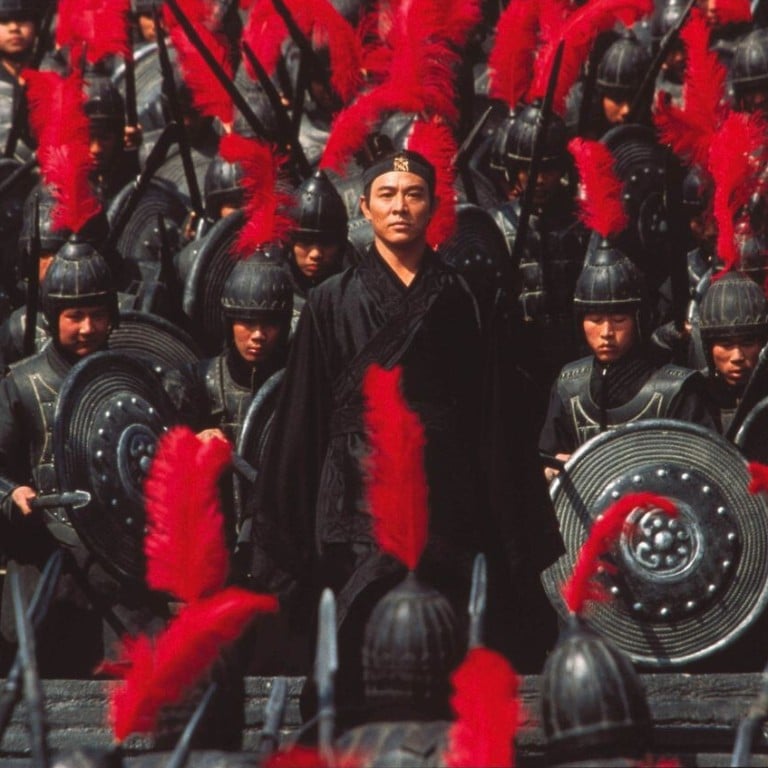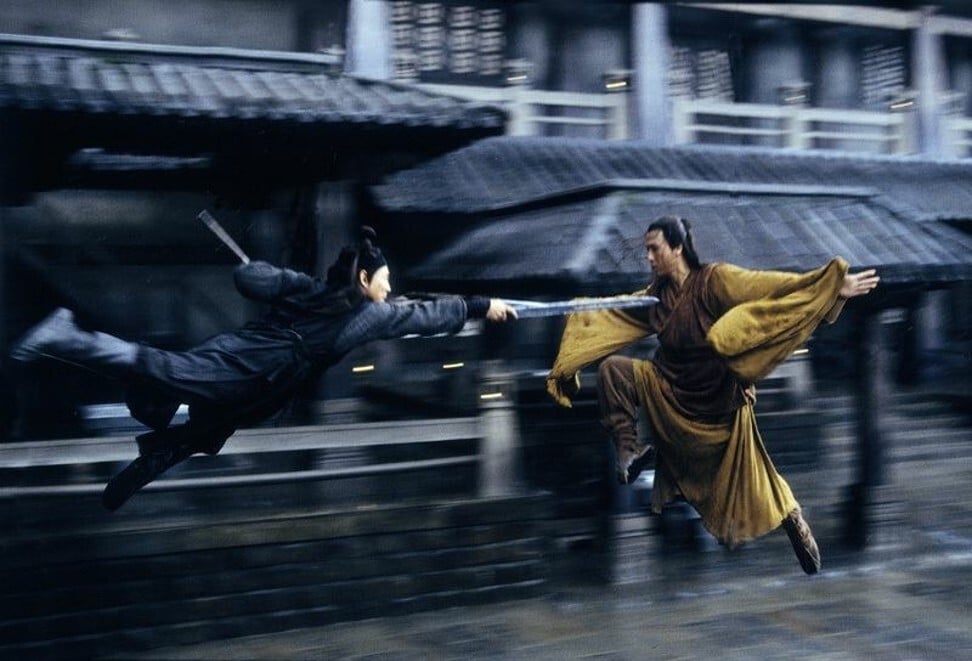
How Jet Li’s nameless Hero encapsulates Zhang Yimou’s political philosophy in classic martial arts film from 2002
- Director Zhang has said Hero isn’t political, but that’s hard to believe with its justification of China’s philosophy that authoritarianism is better than chaos
- Jet Li stars as unknown swordsman Nameless, with Hong Kong talent including Donnie Yen, Maggie Cheung and Tony Leung also featuring
Chinese director Zhang Yimou has said that he intended 2002’s Hero to be a cross between an art film and a martial arts movie. The result, however, is more like an uneasy combination of wuxia film and historical drama.
The martial arts scenes are elegant, the massive set-piece battles are impressive, and the delicate and careful aesthetic that underlies the film makes it beautiful to watch. But Hero’s weighty themes aren’t a good fit for the many scenes of fantasy martial arts, and some heavy-handed messaging often makes it come across as a propagandist film that justifies authoritarianism in the name of order. Zhang fared better with his second wuxia film, The House of Flying Daggers, which was an unabashed genre work dressed up with beautiful costumes and equally elegant martial arts sequences.
The film is set around 230BC during China’s Warring States period, when the country was divided into seven warring kingdoms each vying for supremacy. The tyrannical king of Qin finally defeated six rival kingdoms in a series of brutal campaigns, and unified China for the first time. (Spoilers below.)
The story, which was conceived by Zhang, is loosely based on a failed real-life assassination attempt. Hero tells the tale of a fictional group of assassins from the kingdom of Zhou who set out to kill the tyrannical king of Qin because he is waging total war on their literate and civilised kingdom. In a nod to Akira Kurosawa’s Rashomon, the story – which is told in flashback – presents various different iterations of events until the truth is finally revealed.
Jet Li Lianjie plays Nameless, an unknown swordsman who has devised an invincible attack move that will allow him to kill the king from 100 paces – the closest that anyone is allowed to come to him.
Hong Kong martial arts cinema – everything you need to know
To gain entrance to the king’s fortress, Nameless aims to win his trust by attempting to kill three martial artists from Zhou who had failed to assassinate him in the past: Sky (Donnie Yen), Flying Snow (Maggie Cheung) and Broken Sword (Tony Leung).
But Broken Sword convinces Nameless that national unity is preferable to chaos, even if that unity is brought about by a murderous tyrant. The assassination attempt is ultimately abandoned, allowing the king to continue with his bloody conquests and unite China.

In an interview with American television show Cinema AZN, Zhang said that he had been a fan of martial arts novels since his childhood. Zhang grew up during the Cultural Revolution, and read a wuxia novel in secret, as most books had been banned for being anti-Communist.
“If the book had been discovered, it would have meant trouble for the whole family,” he said. “But ever since then I have become truly consumed by martial arts literature. I have always felt it is a playful and engaging subject.”
I wanted to take the [martial arts] genre in a new direction. In my story, the goal is to downplay violence. The characters are motivated by their desire to end the war
Zhang had never directed an entertainment film, and had no experience of directing martial arts scenes, so he hired Hong Kong director and martial arts choreographer Ching for the swordfighting sequences in Hero. Ching was an old friend, as he had directed Zhang as an actor (and Gong Li, who was then Zhang’s lover) in 1990 fantasy action film A Terracotta Warrior.
Ching directed A Chinese Ghost Story and Swordsman II for Tsui Hark, and is known for his frantic and fantastical fight sequences, which make prolific use of crazy special effects and props. But the combat scenes in Hero, shot by Christopher Doyle, are just the opposite – they are gentle, carefully composed, and make heavy use of slow motion.
Although the scenes are pretty, the constant slow motion has the effect of abstracting the fight scenes and removing their tension. Directors of martial arts films always try to slow their performers down, as sometimes their real-life moves are too fast to look effective on screen. But Hero’s choreography is so slow and stylised that the fights appear more like formalised dances than combat.

Zhang said he had no knowledge of martial arts films, and did not know the rules of the genre. This resulted in a kind of “outsider” film. The genre’s typical themes and tropes, such as trying to square Confucian and Buddhist values with the need to commit violent actions, and the duty to avenge a murdered family member, simply do not figure in his story. His characters are modernised variations of wuxia heroes who possess very contemporary personalities.
Zhang has described has the film’s message in cultural rather than political terms, saying that it emphasises the “idea of bodily sacrifice … that an individual should sacrifice himself for the benefit of the whole”. But it’s difficult to ignore the film’s propagandist politics, which are a justification of China’s philosophy that authoritarianism is better than chaos.

Zhang has said the film is not political, but that is difficult to believe. He is not a naive filmmaker, and his early films cleverly hid well-planned criticisms of Communism inside their period settings. Zhang frequently ran into trouble with the authorities, and films like To Live were often temporarily banned.
Not One Less and The Road Home – the films he made before Hero – saw Zhang transition from being a rebel to the political establishment’s favourite filmmaker, and Hero seems to be part of that pattern.
In this regular feature series on the best of Hong Kong martial arts cinema, we examine the legacy of classic films, re-evaluate the careers of its greatest stars, and revisit some of the lesser-known aspects of the beloved genre.
